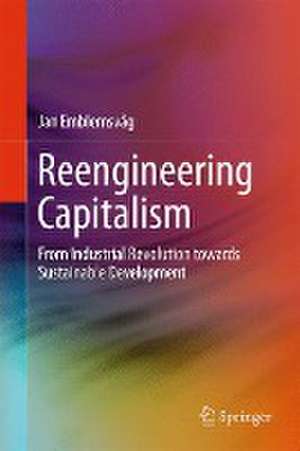Reengineering Capitalism: From Industrial Revolution towards Sustainable Development
Autor Jan Emblemsvågen Limba Engleză Hardback – 20 aug 2015
| Toate formatele și edițiile | Preț | Express |
|---|---|---|
| Paperback (1) | 642.18 lei 6-8 săpt. | |
| Springer International Publishing – 22 oct 2016 | 642.18 lei 6-8 săpt. | |
| Hardback (1) | 648.42 lei 6-8 săpt. | |
| Springer International Publishing – 20 aug 2015 | 648.42 lei 6-8 săpt. |
Preț: 648.42 lei
Preț vechi: 762.85 lei
-15% Nou
Puncte Express: 973
Preț estimativ în valută:
124.11€ • 134.86$ • 104.32£
124.11€ • 134.86$ • 104.32£
Carte tipărită la comandă
Livrare economică 21 aprilie-05 mai
Preluare comenzi: 021 569.72.76
Specificații
ISBN-13: 9783319196886
ISBN-10: 331919688X
Pagini: 261
Ilustrații: XV, 315 p. 30 illus., 15 illus. in color.
Dimensiuni: 155 x 235 x 25 mm
Greutate: 0.64 kg
Ediția:1st ed. 2016
Editura: Springer International Publishing
Colecția Springer
Locul publicării:Cham, Switzerland
ISBN-10: 331919688X
Pagini: 261
Ilustrații: XV, 315 p. 30 illus., 15 illus. in color.
Dimensiuni: 155 x 235 x 25 mm
Greutate: 0.64 kg
Ediția:1st ed. 2016
Editura: Springer International Publishing
Colecția Springer
Locul publicării:Cham, Switzerland
Public țintă
ResearchCuprins
Frame of Reference.- The Quest so Far – and Why it has Failed.- Risk and Uncertainty – Crucial Issues in Finance and Innovation.- Realigning Finance to its Original Purpose.- Reengineering Capitalism.- Introducing Energy Accounting.- Technological Development – Necessary but not Sufficient.- The Role of the Government.- The End of the Beginning.
Notă biografică
Jan Emblemsvåg is Senior Vice President of Rolls-Royce Marine with full responsibility for all commercial ship design and systems integration. He is also an Adjunct Professor at Ålesund University College, gives lectures and serves as a management consultant if time permits. He holds his Ph.D. in engineering design, but his research and work is inter-disciplinary ranging from cost management, strategy/risk management, general management to business development. He has published three books before – the most notable is one on Activity-Based Life-Cycle Costing published by John Wiley & Sons in 2003. He has also published more than dozen journal papers on a variety of subjects since 1994.
Textul de pe ultima copertă
This book provides an innovative approach to sustainable development, one based on insights gleaned from the Industrial Revolution to the present, and which highlights the importance of aligning economic interests with sustainable development considerations. It investigates how a broad-based systematic approach can be used to develop societies sustainably by integrating environmental issues into the capitalist system without value-laden approaches, which produce little more than politics and inaction as we are witnessing today. The proposed approach focuses on realigning the financial markets to providing capital at reasonable cost to fuel innovation towards sustainable development across the entire economy. This requires government policies that level the playing field and also intervene strategically in cases where the playing field is weak or missing . Intended for researchers, policy-makers and graduate students, the book will also benefit non-governmental organizations, economists and the general public.
Caracteristici
Proposes a different approach to achieving future global sustainability Investigates how a systemic approach can be used to improve sustainability within society Explores the roles that technological innovation and changes within society can play in improving sustainability Includes supplementary material: sn.pub/extras



























